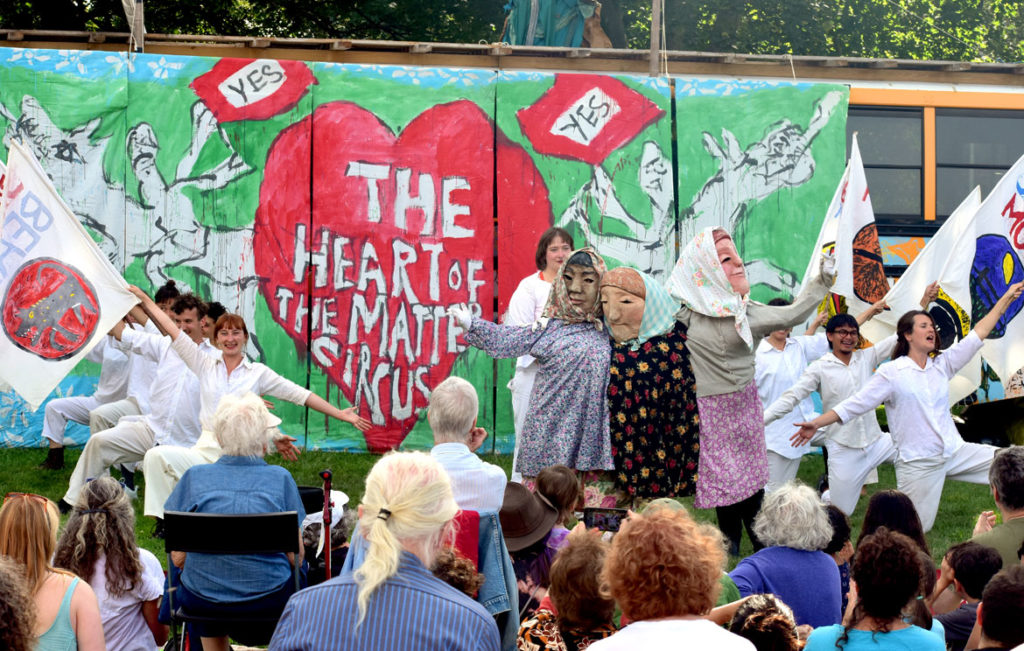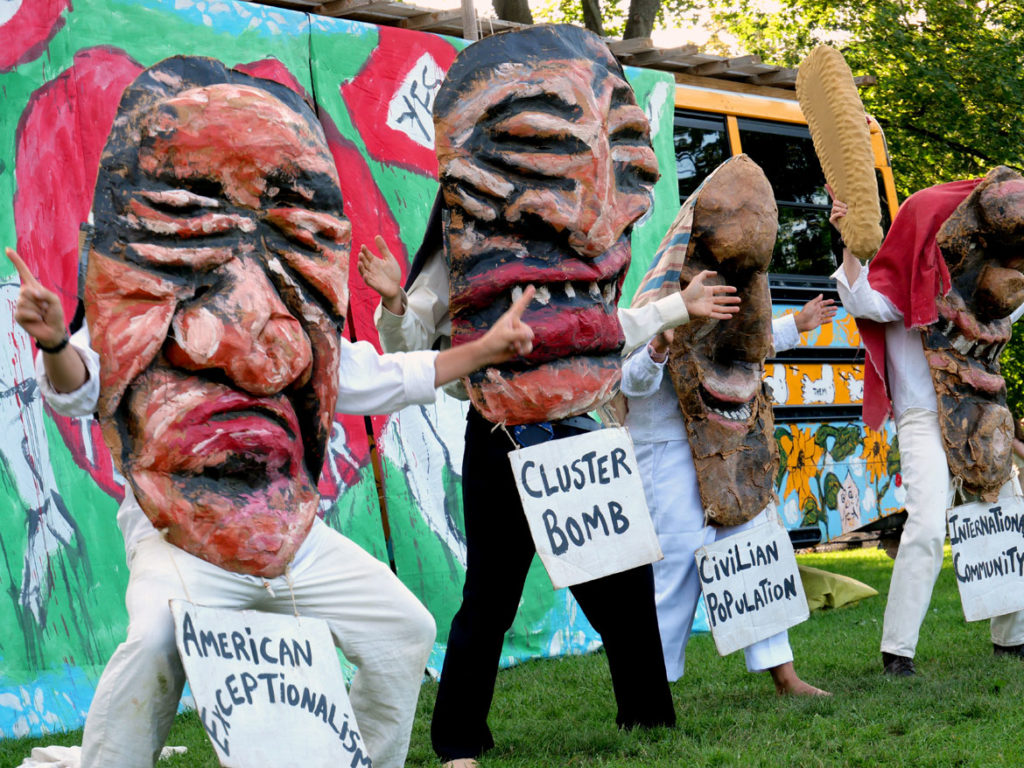
Bread and Puppet Theater performs “The Heart of the Matter Circus” at Cambridge Common, Sept. 2, 2023. (©Greg Cook photo)
Presented by Bread and Puppet Theater
Touring through September 9th, 2023
Vernon, NJ
Thursday, September 7 @ 6pm
Meadowburn Farm
42 Meadowburn Rd, Vernon, NJ 07462
Brooklyn, NY
Friday, September 8 @ 4pm & 8pm
Old Stone House
336 3rd St., Brooklyn, NY 11215
Annandale-on-Hudson, NY
Saturday, September 9 @ 4pm
Montgomery Place Estate @ Bard College
Easthampton, MA
Sunday, September 10 @ 5:30pm
Park Hill Orchard
82 Park Hill Road, Easthampton, MA 01027
Pittsford, VT
Monday, September 11 @ 6pm
Pittsford Village Farm
42 Elm Street Pittsford, VT 05763
Review by Maegan Bergeron-Clearwood
CAMBRIDGE, Mass. — Much has been said recently about the seeming demise of American theater, with company after company reducing production capacity or closing their doors for good. Earlier this summer, The New York Times lamented this trend with the doom-and-gloom headline, “A Crisis in America’s Theaters Leaves Prestigious Stages Dark,” and a focus on big-name regional theaters – after all, if “prestigious” institutions are going under, surely this spells disaster for theater as a whole.*
But is this trend really a harbinger of an institution-wide apocalypse? Or is it a warning – that we need adjust our practices now, by prioritizing sustainability and care over exploitation and profit?
Bread and Puppet Theater, currently on its September circus tour through New England, is a notably excluded from the Times’ list of prestigious closures. The company, founded in 1963 and still going strong at its homebase in Glover, Vermont, is known for its radical politics, which are evident not only in its content, but perhaps more importantly, in its practices. Bread and Puppet has embraced sustainable artistic process since its inception, so it is perhaps no coincidence that it’s bucking the trend of grim profit margins and staff layoffs.
Bread and Puppet’s current touring show, The Heart of the Matter Circus, is nothing new for them or its audience members, some of whom have been taking part in the company’s revelries for decades. When the company parked their iconic school bus on the Cambridge Commons yesterday, all the typical Bread and Puppet happenings happened: stilt-walkers and larger-than-life puppets were greeted by oohs and aahs; kids and families frolicked in the grass, dancing to the brass band’s jazzy interludes; after the show, spectators lined up to be served sourdough bread, buy “cheap art,” and mingle with the puppeteers.

Bread and Puppet Theater performs “The Heart of the Matter Circus” at Cambridge Common, Sept. 2, 2023. (©Greg Cook photo)
Founder and director Peter Schumann describes this year’s show as being “in response to our totally unresurrected capitalist situation, not only the hundreds of thousands of unnecessarily sacrificed pandemic victims but our culture’s unwillingness to recognize Mother Earth’s revolt against our civilization.” The performance addresses a spectrum of political crises: some recent and some ongoing, some hyper-local, some global. At one point the audience is reminded of the lingering consequences of the United States’ 1960s use of cluster bombs on civilians in Laos; at another point, the ensemble performs a raucous dance number in honor of the emergency workers who are continuing to respond to this summer’s severe flooding in Vermont.
From my spot in the crowd, the interconnectedness of these issues wasn’t made very clear, and the messaging seemed overly simplistic, but then again, it isn’t what Bread and Puppet says that really matters – it’s how they say it. The company’s ethos of sustainability and collective storytelling is infectious. Their spectacle-driven vignettes won’t change anyone’s minds (it’s safe to say that most people at a Bread and Puppet show are fairly politically aligned) but their gatherings are a reminder that alternative modes of living and artmaking are possible.
Of course, sustainability is hard work, and even for this 60-year-old company, survival is not a guarantee. In a recent article, Schumann, who is 89 years old and still heavily involved in the company’s creative process, wonders: “This company has always been an iffy little enterprise that depends way too much on me… Is it sustainable when I’m gone and will people recognize it as important?”
Bread and Puppet isn’t a flawless experiment in anticapitalist theatre-making, but still: even if Schumann were to die tomorrow and Bread and Puppet were to immediately shut its doors, I think it’s safe to say that the legacy of the company will live on. At the very least, its longevity is proof that art can, and needs to be, sustainable – for artists, for communities, and for the earth.
If Bread and Puppet is swinging by your town this September, I hope you’ll pack a picnic basket and join in the fun – just make sure to leave room for bread.
*Closer to home, WBUR spoke to Boston-area theater artists about the trend, taking a more holistic, and more hopeful, angle. Amelia Mason talks to representatives from companies of various sizes and shines the light on a few success stories. There are some tangible takeaways from this article, particularly around how to reach younger audiences and produce work more sustainably. In brief: tell more diverse stories, slow down (less is more), and treat your staff and artists equitably.
